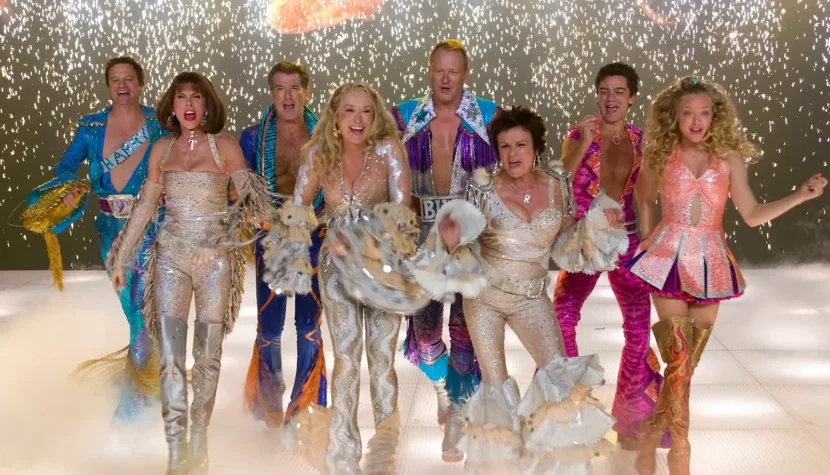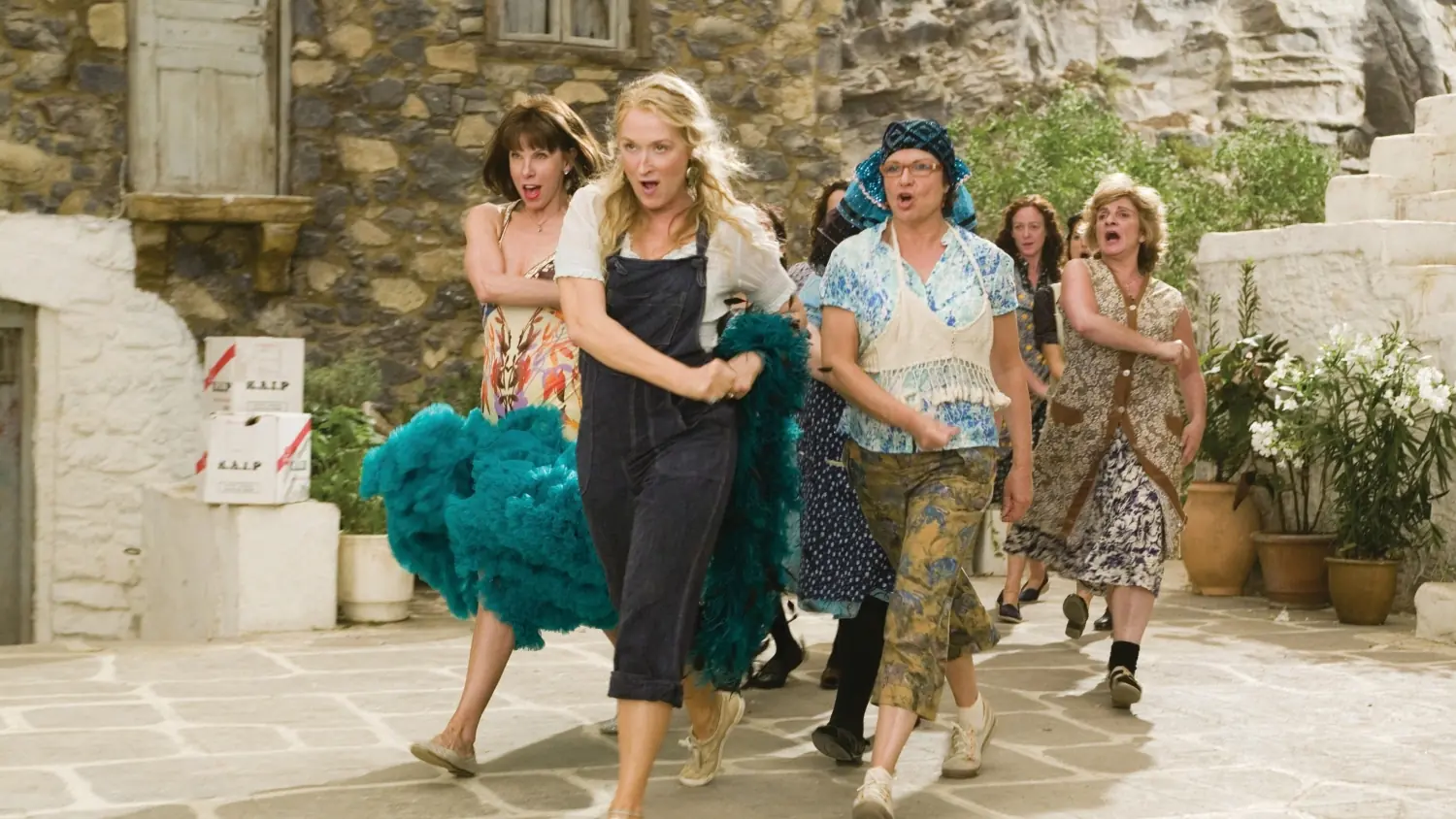MAMMA MIA! A retro-style antidepressant

The Year 1974. A then-unknown Swedish band, ABBA, wins the Eurovision Song Contest—a time when the competition still held considerable prestige—ushering in perhaps not global madness but certainly a phenomenal musical phenomenon. Simple, catchy songs with surprisingly thoughtful lyrics, sung with full commitment by two charming women who spoke little English (Anni-Frid Lyngstad and Agnetha Fältskog), and composed by two extraordinarily talented young men (Benny Andersson and Björn Ulvaeus), remain as popular as ever, even more than forty years later, at parties of all kinds—not just retro-themed ones. ABBA was, and still is, a product that consistently delivers profits. Although the band lasted only ten years and disbanded in 1982, their work continues to be mined for new inspiration. In 1999, a quarter-century after the wild success of “Waterloo,” a musical Mamma Mia! based on ABBA’s hits premiered in London’s West End.
British theater director Phyllida Lloyd decided to use ABBA’s biggest hits to tell a simple story: a young woman on the eve of her wedding wanting to connect with the father she never knew. The problem? According to a diary she found in her mother’s attic, there are three candidates for the role—an Englishman, an American, and an Australian—who all arrive on a dreamy Greek island to confront their memories and navigate an unexpected present. Naturally, the musical was a resounding success. It remains the highest-grossing musical theater production globally and is still performed today—it premiered at the Roma Musical Theatre in Warsaw just last year. So it’s no surprise that Phyllida Lloyd also agreed to direct the film adaptation of Mamma Mia!.
Nearly a decade after the stage premiere, the film hit theaters, featuring an all-star cast: Meryl Streep, Pierce Brosnan, Colin Firth, Stellan Skarsgård, and Amanda Seyfried. A somewhat surprising choice of actors for a musical.

As mentioned, anything under the ABBA brand is destined for success. Film producers thus felt free to make an unusual move: casting actors in leading roles who—putting it mildly—weren’t exactly musically trained.
This, of course, doesn’t apply to the incredible Meryl Streep, who—according to legend—could play even a chair, let alone something as straightforward as singing. Already hailed as the greatest actress of all time, Meryl Streep shines in Mamma Mia! like the brightest star she is. She sings, dances, jumps into the water, and electrifies the screen with her boundless energy. She looks as though she stumbled onto the set by chance, in the middle of more serious work, and decided to join the party Lloyd had organized for her stars.
Her male co-stars, however, are a different story. Playing Donna’s former lovers and candidates for young Sophie’s father are Pierce Brosnan, Colin Firth, and Stellan Skarsgård. All are excellent actors, of course, but vocally they pale in comparison to Streep, the musical’s central figure. The greatest challenge fell to Brosnan, whose vocal parts as Sam Carmichael were the most demanding. He managed, though not without effort, as evident in his solo moments. This is particularly noticeable in his duet with Streep, S.O.S. Nevertheless, regardless of vocal impressions, Brosnan’s earnest performance of “When you’re gone, though I try, how can I carry on?” likely touched more than a few hearts.
Firth and Skarsgård, as Harry Bright and Bill Anderson, have slightly easier roles. Firth sings his parts with the charm of a campfire leader—his voice not particularly strong but pleasant enough. Skarsgård fares decently as Bill as well. Interestingly, the filmmakers seemed particularly keen on casting him, even changing Bill’s nationality from Australian to Swedish. This decision makes sense, considering how much of Mamma Mia! relies on the cast’s comedic chops. And in this area, all three men excel, complementing each other beautifully. Brosnan has long shown he doesn’t take himself too seriously, Firth humorously contrasts his English reserve with comedic gags, and Skarsgård, with his honest hedonist’s demeanor, brings a touch of madness and adventure to the mix.

Amanda Seyfried, as Sophie, also deserves mention. Playing a young woman sheltered by her mother on a small Greek island, Seyfried convincingly portrays her character with wide-eyed naivety and a girlish smile. Her vocal performances, delivered with ease and confidence, prepared her well for the bigger challenge she faced shortly after Mamma Mia!—the film adaptation of Victor Hugo’s Les Misérables.
ABBA’s greatest hits, woven into a simple, delightful story, make Mamma Mia! a celebration of life. A life that’s unreal, bathed in sunshine on a paradise island, flowing with music and dance. Even financial troubles are depicted as fleeting concerns, more worthy of laughter than serious worry (you get the sense that the mention of money problems exists only to justify the inclusion of the fantastic number Money, Money, Money). The ensemble number to Dancing Queen, where the island’s women join in a joyous march to the beach, either gets you off the couch or, at the very least, has you tapping your foot along to the beat. Despite small obstacles and minor doubts, the story dances its way to the wedding finale (though Lloyd couldn’t resist adding a small twist). Mamma Mia! is a classic romantic comedy, spiced with music beloved by generations.
Reportedly, when Björn Ulvaeus first heard Meryl Streep perform The Winner Takes It All, he called her a miracle. How, then, to describe the fact that the legendary ABBA members—at odds for years, to the point of refusing to appear together in public—reunited, all four of them, at the Swedish premiere of the film? Without a doubt, Mamma Mia! carries a spark of magic.

